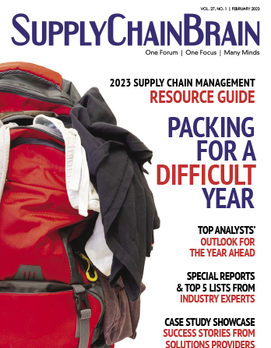
Home » The Kombucha Craze: Growing a Niche Market With a ‘Regenerative’ Supply Chain
SCB FEATURE
The Kombucha Craze: Growing a Niche Market With a ‘Regenerative’ Supply Chain

February 27, 2023
In the world of specialty beverages, margins can be perilously thin. But for one seller of craft products, sustainability is just as important as profitability.
Buchi Kombucha launched in 2009 as a small brewer out of Asheville, North Carolina, looking to make inroads into the nascent market for fermented beverages. Buchi was its sole brand at the time, and enjoyed a degree of success early on. Within a few years, however, the company became unsatisfied with its marketing strategy.
“As we grew, we found there was a misalignment with our mission — to nurture life and be in a place that offers nutrient-dense beverages and foods to as many as possible,” says Zane Adams, chief marketing officer of Buchi Kombucha and its holding company, FedUp Foods.
Call it a combination of New Age thinking and hard economics. But Buchi Kombucha took the unusual step of de-emphasizing its own brand and pivoting to becoming a supplier to private labels, under the FedUp Foods banner. The underlying product would be sold in the same stores that would stock the more expensive branded version. Buchi saw it as the best way to scale craft-brewing production while adhering to the principles of a ”regenerative” supply chain.
Today, the Buchi-labeled product continues to be sold under that name, but it’s also used as a control brand to help build category space, Adams says.
“We go in and tell retailers that we can create a destination in your cooler space, and start a conversation around fermented functional foods,” he says. “If it does well, a lot of times it will roll into our private-label program.”
The goal is to broaden the popularity of kombucha, the fermented, sweet-and-sour tea drink which currently accounts for a small slice of the total consumer beverage market. “Not since yogurt was there been such an odd food group in a commercial setting,” Adams says.
The Buchi-branded kombucha had been sold in around 5,000 stores, mostly in the East and Southeast, but the shift to private label began in earnest during the pandemic. Today, it spans much of North America, with additional presence in Central and South America, the Caribbean and Puerto Rico. Within the U.S., the company has private-label programs with approximately 15 retailers.
All of this activity is underpinned by a commitment to sustainability — or, as Buchi prefers, a regenerative supply chain. Adams says the concept takes form in three “buckets,” the first of which is the use of microbiological, nutrient-dense topsoil by farmers. That translates into a healthier end-product, he says.
The second bucket is an emphasis on resilience. It’s about “how we source, our ability to respond in a crisis, and the capability to understand what’s happening in the climate and the world,” Adams says. The effort includes certifying growers under fair-trade guidelines, and the use of sustainable packaging.
Localized sourcing is an important factor in reducing carbon emissions caused by long-distance transportation, but Buchi takes a nuanced approach to the model. “We used to have a hyper-local position, but when you get to a level of scale that’s sometimes not possible,” Adams says. In some cases, a local supply opportunity might be passed over for more a distant supplier that has been carefully vetted for its carbon-offsetting and fair labor practices.
Buchi’s emphasis on resilience, balancing the need for profit with that of tight connections to select growers, meant that it didn’t experience the supply chain interruptions that plagued so many other food producers during the pandemic. “Because we had been investing in that relationship, when we needed ginger, it was able to still happen,” Adams says. “We were able to work together to solve that.”
The third bucket of a regenerative supply chain is people. Adams says personal relationships were key to maintaining supply of essential materials. That might mean absorbing a loyal supplier’s price increase instead of looking for a cheaper source. “If costs go up, you can try to pass it down to the store, but it’s not elastic,” Adams says. “It’s very rare that we can pass it all the way through.” He’s hoping that projected growth in 2023 will offset some of the losses that the company took in the interest of cementing relations with trusted suppliers.
The coming year, of course, could deliver yet another wallop, in the form of recession. But Adams believes Buchi’s strategic marketing shift will insulate it from the impact of an economic downturn. When consumers feel pinched, they turn away from traditional store brands in favor of cheaper alternatives. Nor do private-label suppliers have to deal with the extra costs involved in fighting for shelf space, which can jack up prices by 20% to 40%. “Private label is one of the most underrated but superstar products gathering on our shelves as Americans,” he says. “It doesn’t really get the credit it deserves.”
With growth comes the challenge of maintaining a regenerative supply chain. Adams says Buchi is working with small to medium-sized growers to help them scale up production in a sustainable manner. There’s also the question of how to maintain a steady supply of essential ingredients — tea, sugar, ginger, turmeric — in the face of climate change.
“Part of our challenge is to stay ahead of that, and find opportunities where not everyone else is playing,” he says.
RELATED CONTENT
RELATED VIDEOS
Subscribe to our Daily Newsletter!
Timely, incisive articles delivered directly to your inbox.
Popular Stories

2023 Supply Chain Management Resource Guide: Packing for a Difficult Year
VIEW THE LATEST ISSUECase Studies
-
JLL Finds Perfect Warehouse Location, Leading to $15M Grant for Startup
-
Robots Speed Fulfillment to Help Apparel Company Scale for Growth
-
New Revenue for Cloud-Based TMS that Embeds Orderful’s Modern EDI Platform
-
Convenience Store Client Maximizes Profit and Improves Customer Service
-
A Digitally Native Footwear Brand Finds Rapid Fulfillment



